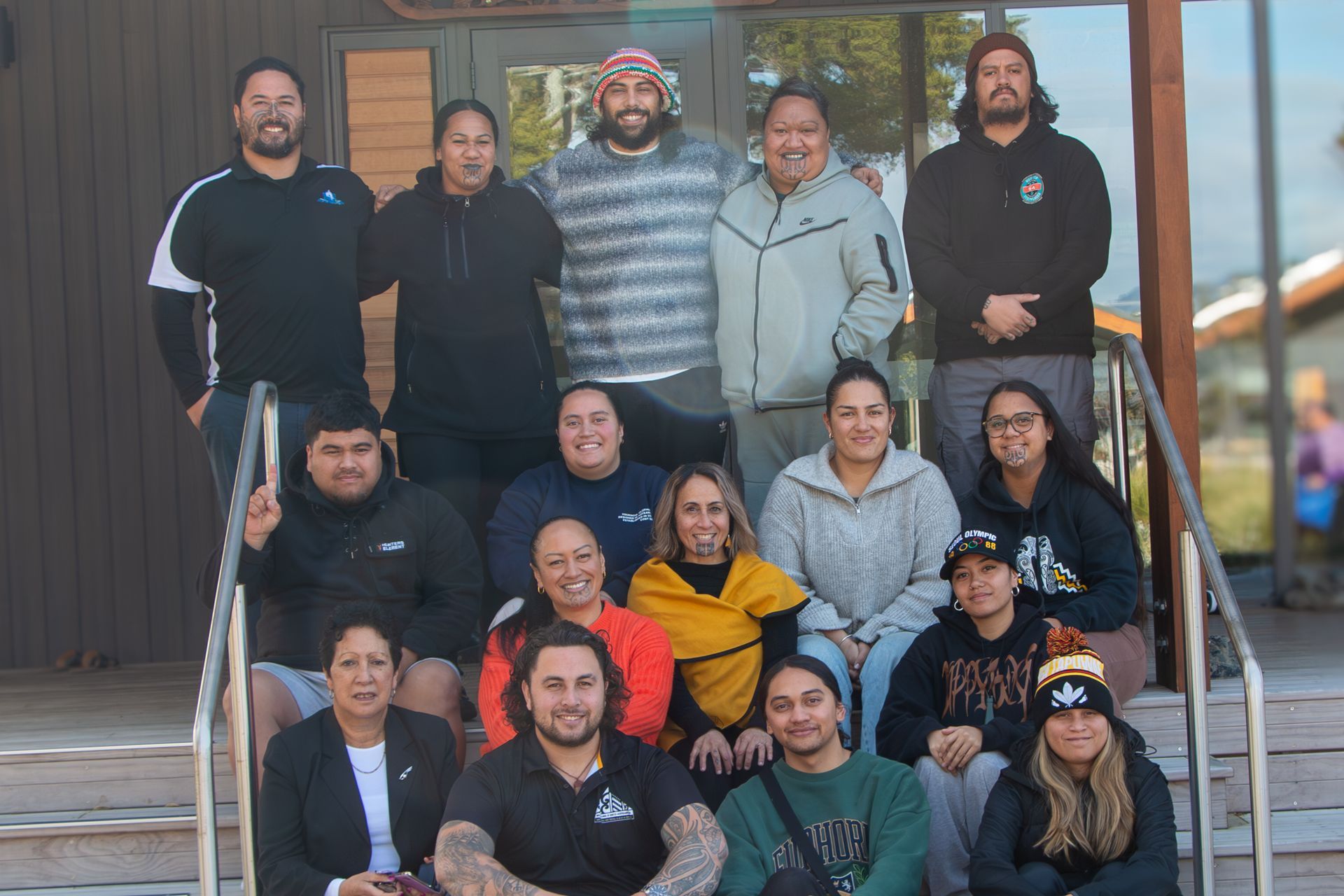poutuarongo whakaakoranga wharekura
Bachelor of Teaching (Level 7, Wharekura, Rumaki Reo, EBITE)
He Kura Te Tangata!
This course is an Employment Based Initial Teacher Education (EBITE) programme for those who work within Kura Māori (Māori Medium), have intermediate to advance level te reo Māori, have the support of their Tumuaki, and wish to train as a student teacher under a Limited Authority to Teach (LAT) for the next two years. The applicant must have the support of a Kura Māori, through the Tumuaki and be assigned a Poumaru (in-school mentor) for their two years of studies.
This course requires the applicant to have had at least two years of experience within kura and can show evidence of this to meet the entry requirements for Year Two. Therefore the process is robust and the applicant must:
- Complete an Expression of Interest (EOI) form, confirming their Kura and Tumuaki support of the applicant.
- The Pūkenga of the course will review the EOI and arrange a hui with the applicant.
- Following the hui, the applicant will be sent a Recognised Prior Learning (RPL) application. This requires the applicant to gather a portfolio of evidence that will be examined by a panel, against key teaching tasks of the Year 1 course papers.
- If successful, the applicant will then be invited to attend an online interview.
The successful applicant will then be accredited the Year One specialist papers of the Poutuarongo Whakaakoranga Wharekura course and will enter the programme as a Year Two tauira.
Practice and working theories will be developed and refined over the two year course to ensure tauira are competent and capable. Importance is placed on ensuring that te reo and tikanga Māori are the bedrock of sound wharekura (Māori immersion Yr7 – Yr13) practice, as tauira will be required to teach and apply knowledge through the medium of te reo Māori and tikanga Māori.
Teaching fundamentals such as planning and assessment, curriculum content, classroom management and teaching strategies, student management systems, and best practice for teaching literacy and numeracy are all placed within a Māori philosophical and values framework. Te reo competency and fluency is supported through content delivery and a specific focus on increasing language proficiency both oral and written. Iwi and hapū studies further underpin the integration of aronga Māori (Māori worldview) across the programme.
Graduates from this qualification contribute to the ongoing revitalisation of te reo me ōna tikanga, and the maintenance and prosperity of whānau, hapū and iwi and their marae. They will demonstrate the values inherent in kaupapa tuku iho and reflect the qualities and responsibilities defined by the Code of Professional Responsibility and Standards for the Teaching Profession.
The Poutuarongo Whakaakoranga Wharekura is NZQA accredited and approved by the New Zealand Teaching Council.
To enrol in this qualification please complete an Expression of Interest Form.
A Pūkenga will then be in touch with you.
The Ministry of Education have funding awards that support this teaching qualification.
See their website here for more details.
TE REO AND IWI AND HAPŪ STUDIES
You will study two papers each year towards your Iwi and Hapū studies to compliment your learning, these are often the most rewarding part of study for the majority of our students as they gain a deep connection back to their roots. Your Iwi and Hapū papers will be online with excellent tutor support to help you through, week by week activities. The assignments that you complete will become a taonga and resource for your whānau, marae, iwi and will be treasured for years to come.
Iwi and Hapū studies begin in the first week of the academic year, so you can begin your studies on or before your first specialisation noho. You will also get the opportunity to meet your Iwi and Hapū Pūkenga during your first noho on campus.
Code:
PWW
Credits:
360
Duration:
2 years
Level:
NZQA Level 7
Delivery:
Residential seminars, self directed learning and online delivery
Location:
Mode:
Te reo Māori
Next Intake:
27 Jan – 21 Nov 2025
Tuition Fees:
TBA
Entry Requirements:
- Have the support of your Kura āwhina to complete this programme whilst employed in that kura.
- Have been employed or have volunteered in a Māori medium Level 1 (80-100%) kura for a minimum of 2 consecutive years in the last 5 years.
- Have a Limited Authority to Teach (LAT) status, OR my kura will submit an application to the Teaching Council for LAT status.
- Have an intermediate to advanced level of te reo Māori
- Have an intermediate level of Information Communication Technologies
- Have an intermediate level of literacy and numeracy
- Have a desire, passion and commitment to teach in a kaupapa Māori environment
- Have support from your iwi and hapū.
Regular internet access, email address and computer or laptop with a working mic and camera are required. For more information on entry requirements see appendix one of the academic regulations.
Curriculum
Marautanga
Year One
Year Two
Year Three
After Graduation
Ka puta te ihu
- Kaiwhakaako Māori
- Education Advisor
- Primary School Teacher / Tutor
- Secondary School Teacher
- Special Education Teacher
- Tertiary Lecturer
- Policy Analyst
- Counsellor
- Language Specialist
why te wānanga o raukawa
Distinctively Māori
Te Wānanga o Raukawa is a unique centre for higher learning and development, dedicated to the dissemination of Māori knowledge.
Higher Level Māori Learning
With a strong wish to see Māori achieving at the highest levels of education, Te Wānanga o Raukawa has positioned itself to cater specifically to higher level undergraduate, graduate and post graduate Māori students.
Pioneering Māori Education
Te Wānanga o Raukawa was established in 1981 as the first contemporary wānanga of Aotearoa, pioneering the application of kaupapa, tikanga, kawa to the advancement of Māori within a contemporary education context.


